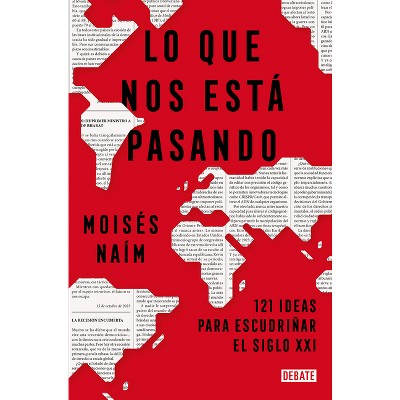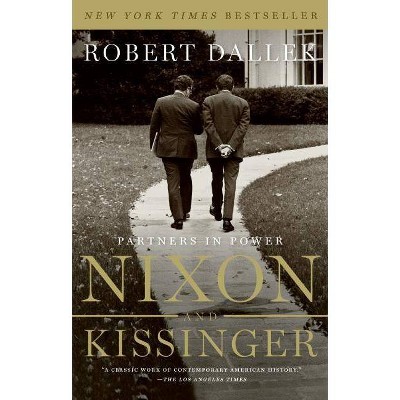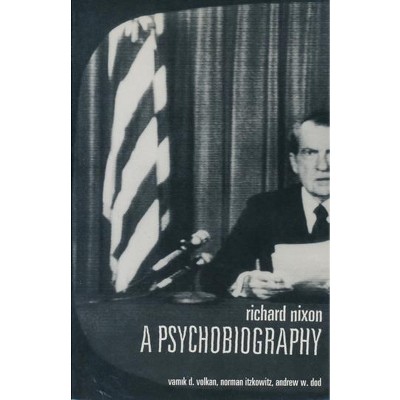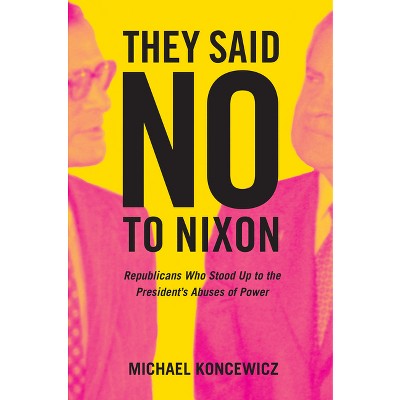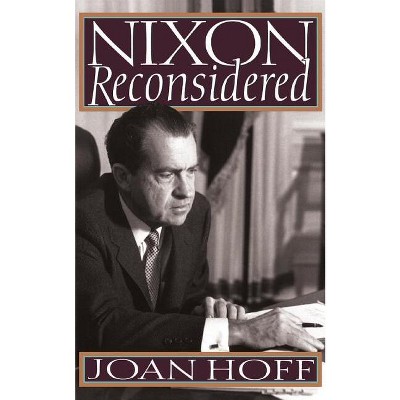Sponsored

Nixon, Kissinger, and Allende - by Lubna Z Qureshi (Paperback)
$57.99
In Stock
Eligible for registries and wish lists
Sponsored
About this item
Highlights
- Detailing the heavy involvement of the Nixon administration in the 1973 coup against the democratically-elected President Salvador Allende of Chile, Qureshi provides the reasons for the coup including the threat Allende posed to the United States' notions of hegemony in Latin America.
- About the Author: Lubna Z. Qureshi earned her doctorate in history from the University of California-Berkeley in 2006.
- 192 Pages
- History, United States
Description
About the Book
Detailing the heavy involvement of the Nixon administration in the 1973 coup against the democratically-elected President Salvador Allende of Chile, Qureshi provides the reasons for the coup including the threat Allende posed to the United States' notions of hegemony in Latin America.Book Synopsis
Detailing the heavy involvement of the Nixon administration in the 1973 coup against the democratically-elected President Salvador Allende of Chile, Qureshi provides the reasons for the coup including the threat Allende posed to the United States' notions of hegemony in Latin America.Review Quotes
Using freshly released U.S. tapes and documents and Chilean sources Lubna Qureshi has written a fresh analysis of the United States' 1973 intervention to overthrow the freely elected government of Salvador Allende. Qureshi demonstrates that the Nixon administration did not truly perceive Allende as a threat to U.S. national security in the overall context of the Cold War. Rather, Nixon and Kissinger feared Allende's socializing and nationalizing actions would encourage other Latin American nations to challenge American hegemony. The major impelling force behind the US intervention in Chile that lead to a dictatorship came from the corporate concerns of President Nixon and pressures from powerful business clients to control the civilian economy.. Woven into this convincing interpretation are episodes of concise narrative including the CIA assisted assassination of General Schneider, the last constitutionalist military leader protecting civilian government against the coup d'etat by General Pinochet, and a discussion of U.S. victims of the vicious aftermath, among them Charles Horman and Frank Teruggi. Qureshi's volume is a significant revisioning and recontextualization of a grim episode from which the thriving, redemocratized, and pace setting Chile has only recently emerged.
For anyone interested in the economic motivations that led the Nixon administration to intervene in Chile, or how Nixon spoke about Latin America and the issue of democracy in private, this is nevertheless a useful book. It is a good book for those wanting to examine the role that dependency and capitalism played in Chile and it will be helpful alongside books on the same subject by scholars like Haslam and Kristian Gustafson for encouraging students to explore different arguments related to U.S. involvement in Chile.
Qureshi's elegantly written study offers a fresh and well-researched interpretation of U.S. foreign policy toward Chile during the Allende presidency. This book explains U.S. opposition to the Allende government by highlighting Nixon and Kissinger's imperial disdain for Latin America in general and Chile in particular, their fundamental ignorance of the region, and the influence of the U.S. business community. Qureshi draws on an array of sources, including the Nixon tapes, U.S. and Chilean government documents, and secondary sources to shed new light on a pivotal moment in U.S. history. She also discusses the history and importance of Charles Horman and Frank Teruggi, two North Americans killed by the Chilean military (with possible U.S. government complicity) following the September 11, 1973, coup that overthrew Allende. For anyone who wants a clearer understanding of U.S. foreign policy toward Chile during the Nixon presidency, this book is essential reading.
About the Author
Lubna Z. Qureshi earned her doctorate in history from the University of California-Berkeley in 2006. She also holds an M.A. from Temple University and a B.A. from the University of Wisconsin-Madison. Her areas of research are U.S. diplomatic history and international history.Dimensions (Overall): 8.8 Inches (H) x 5.8 Inches (W) x .7 Inches (D)
Weight: .65 Pounds
Suggested Age: 22 Years and Up
Number of Pages: 192
Genre: History
Sub-Genre: United States
Publisher: Lexington Books
Theme: 20th Century
Format: Paperback
Author: Lubna Z Qureshi
Language: English
Street Date: January 1, 2010
TCIN: 1004453484
UPC: 9780739126561
Item Number (DPCI): 247-13-9354
Origin: Made in the USA or Imported
If the item details aren’t accurate or complete, we want to know about it.
Shipping details
Estimated ship dimensions: 0.7 inches length x 5.8 inches width x 8.8 inches height
Estimated ship weight: 0.65 pounds
We regret that this item cannot be shipped to PO Boxes.
This item cannot be shipped to the following locations: American Samoa (see also separate entry under AS), Guam (see also separate entry under GU), Northern Mariana Islands, Puerto Rico (see also separate entry under PR), United States Minor Outlying Islands, Virgin Islands, U.S., APO/FPO
Return details
This item can be returned to any Target store or Target.com.
This item must be returned within 90 days of the date it was purchased in store, shipped, delivered by a Shipt shopper, or made ready for pickup.
See the return policy for complete information.
Frequently bought together

$7.14
Buy 1, get 1 50% off select books
4.8 out of 5 stars with 8 ratings

$18.88
MSRP $27.00
Buy 1, get 1 50% off select books
4.8 out of 5 stars with 575 ratings
Trending Non-Fiction

$15.68
Buy 1, get 1 50% off select books
4.8 out of 5 stars with 205 ratings

Highly rated
$19.31
was $20.98 New lower price
Buy 1, get 1 50% off select books
4 out of 5 stars with 68 ratings

$18.28
was $19.58 New lower price
Buy 1, get 1 50% off select books
4.7 out of 5 stars with 17 ratings

$4.59
MSRP $7.99
Buy 1, get 1 50% off select books
4.8 out of 5 stars with 124 ratings

$6.20
MSRP $10.95
Buy 1, get 1 50% off select books
4.8 out of 5 stars with 33 ratings

$7.09
MSRP $9.99
Buy 1, get 1 50% off select books
4.9 out of 5 stars with 46 ratings

